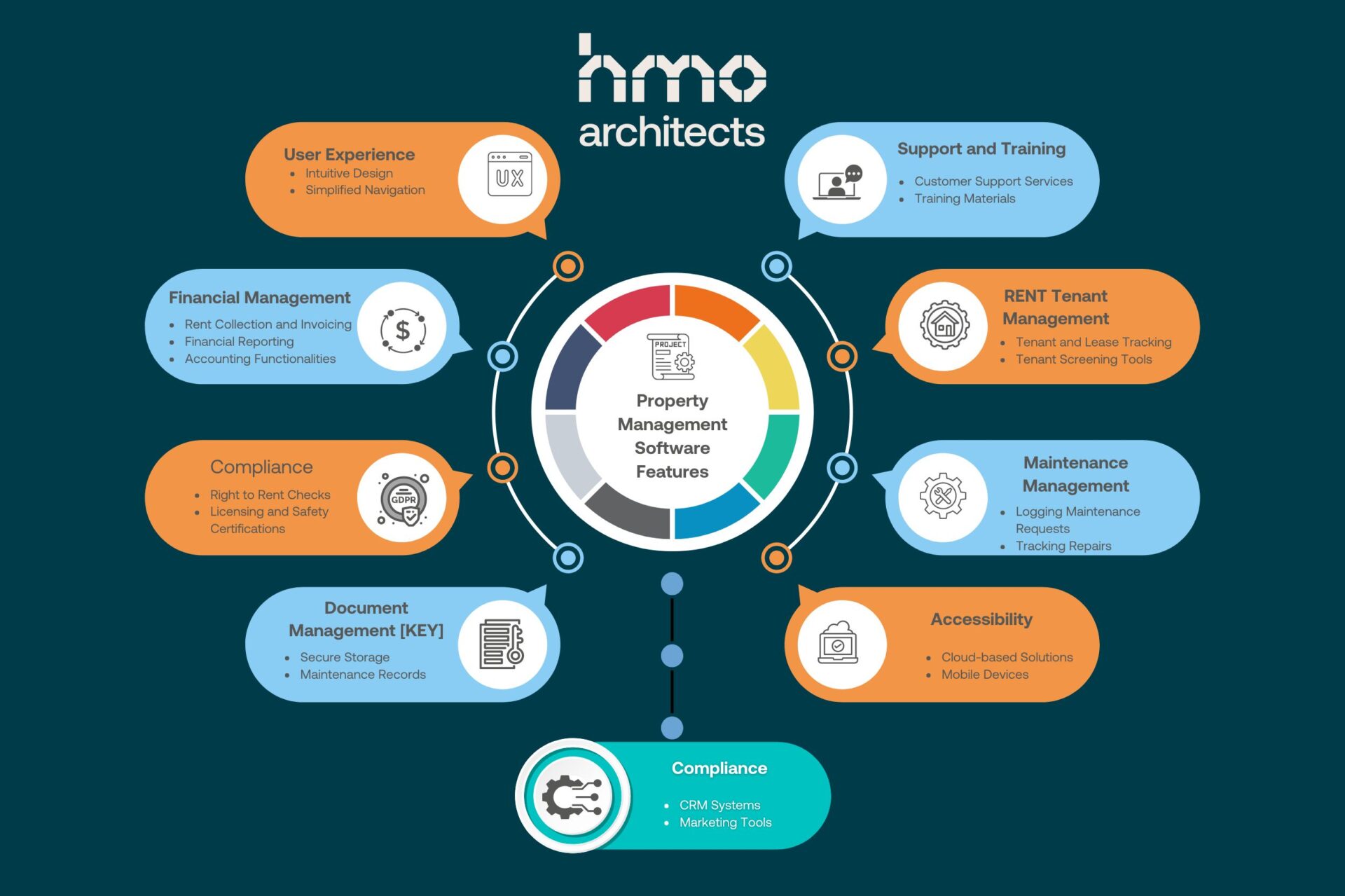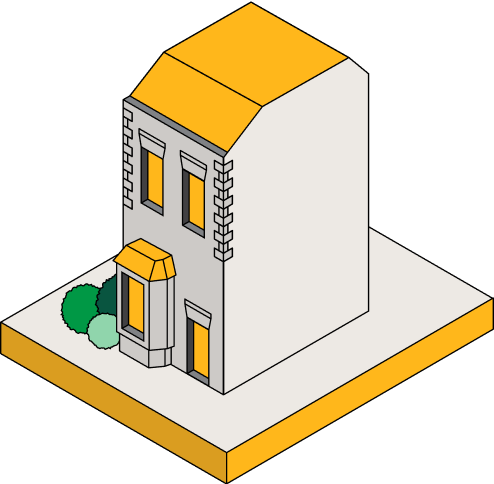
Are you maximising your property’s profitability, or are you constantly putting out fires—chasing late rent, handling last-minute repairs, or racing to meet compliance deadlines? Property management software offers a solution that simplifies the chaos, streamlining everything from rent collection to maintenance scheduling. But with every property portfolio being unique, how do you choose the right tool to meet your specific needs? Let’s explore how the right software can transform your management approach, taking the stress out of daily operations and giving you the features you need to succeed.
What is property management software?
A property management program is a solution for landlords looking to manage their rental properties more effectively. These management tools can automate day-to-day tasks, from tracking rent payments to streamlining tenant communications and handling maintenance requests, all in one place.
Beyond tenant management, rental management software typically includes features for customisation, detailed reporting, and analytics, transforming property management into a fully-fledged business model. In more advanced versions, landlords can integrate additional tools like accounting software and marketing programs, gaining complete control and clarity over rental operations and strategy.
Do you need a management software for your rental property?
Property management is a dynamic and often demanding task, but by leveraging technology, you can leave these challenges behind and streamline your operations instead. Property management software can transform real estate investments, offering solutions and features to improve how landlords manage their portfolios and achieve strategic growth.
How much value could automation add to your investment? Think in terms of avoiding errors, saving time and improving financial management to inform your decisions.
1. Streamlined Operations
One of the standout advantages of property management software is that you can automate routine tasks that traditionally consume a significant amount of time. You can process rent collection, handle maintenance requests, and manage lease renewals automatically, allowing you to focus more on strategic growth and less on everyday management. Automation also reduces the risk of human error, enhancing efficiency so that your operations can run smoothly without constant oversight.
2. Financial Tracking
Tracing your financial operations is vital to measure and maintain the health of your property investment, which can be managed through property management software. Effective platforms include tools designed to track all financial transactions, from expenses and deposits to income from rent. This capability means you can obtain detailed financial reports at the click of a button and access real-time insights into your financial status—crucial for making informed business decisions.
3. Enhanced Communication
Effective communication between landlords and tenants is key to maintaining a good relationship and the smooth operation of rental properties. Rental management software often includes built-in messaging systems and tenant portals facilitating direct and efficient communication, helping tenants to report issues and landlords to respond quickly, increasing tenant satisfaction and retention.
Choosing the best landlord software for your property
When evaluating property management systems, you need to look at the advantages they create for your investment. For a cost-effective decision, you must consider the range of features that are critical for your operation based on criteria such as property size, portfolio diversity, and other more specific needs, including:
- Do you need to factor in different rental models such as Houses in Multiple Occupation (HMOs), Buy-to-Lets, commercial, or short-term lets?
- Do you need to make decisions based on the location or the type of rental —say short-term lets requiring frequent maintenance and cleaning services?
- How comfortable do you feel using digital tools?
- Would you need a cloud-based property management solution?
- Do you need to integrate with other business tools and platforms?
- Are you planning to grow your property portfolio?
15 Key features in property management software
If you’re a landlord managing one or more properties, you understand the value of enhanced efficiency and organisation for your portfolio. An effective execution on your part can go a long way to improve tenant satisfaction and maintain compliance with regulations. So, what are the essentials to cover your priorities—is it about screening tenants and collecting rent or scheduling maintenance and reporting? Or perhaps your portfolio demands more advanced solutions.
- Tenant and Lease Tracking: Ability to manage tenant information, lease agreements, and important dates such as renewals and expirations.
- Tenant Screening Tools: Features to conduct background checks, credit checks, and other screening processes to find your ideal tenant.
- Communication Tools: Built-in messaging systems for effective communication between landlords and tenants regarding issues or updates.
- Rent Collection and Invoicing: Automated rent collection processes, including online payment options and invoicing capabilities.
- Financial Reporting: Comprehensive financial reports to provide insights into income, expenses, and overall portfolio performance.
- Accounting Functionalities: Built-in accounting features or integration with accounting software for streamlined financial management.
- Reporting and Analytics: Advanced reporting features to analyse data trends related to occupancy rates, financial performance, etc.
- Maintenance Management: Tools for logging maintenance requests, tracking repairs, and managing service providers.
- Compliance Management: Tools to ensure adherence to local regulations, such as Right to Rent checks, licensing and safety certifications.
- Document Management: Secure storage for important documents such as leases, maintenance records, and correspondence.
- Mobile Accessibility: Cloud-based solutions that allow access to property management tools from mobile devices.
- User-Friendly Interface: An intuitive design that simplifies navigation and enhances user experience for both landlords and tenants.
- Customisable Features: Options to tailor the software according to specific landlord’s needs or preferences.
- Support and Training Resources: Customer support services and training materials to assist landlords and users in maximising the software’s potential.
- Integration Capabilities: Integrating with other tools or platforms (e.g., CRM systems and marketing tools) for a more comprehensive management solution.

Advanced property management tools
Every property portfolio has unique aspects, and advanced property management tools can provide a strategic advantage for landlords.
Key features like customisation allow you to tailor functionalities to meet specific needs. Scalability means you can adapt to increasing management demands without sacrificing performance, while security measures and protocols, like data protection, guarantee you can safeguard the information and adhere to legal standards, thus providing a comprehensive, secure, and adaptable management solution.
Customisation, scalability and data protection
Customisation lets you modify features to fit your business model and property management style. These can range from simple interface tweaks to complex rule sets for managing different types of properties or tenancies—such flexibility is invaluable in rental models like HMOs. Adaptability is also crucial if you manage multiple properties, helping you maximise time efficiency and ensure compliance across different locations.
Scalability is crucial as it enables the software to grow with your portfolio, adapting to increasing management demands without sacrificing performance. If you’re already growing your property portfolio or planning to do so, evaluate the software for varying portfolio sizes. Some platforms are better suited for small portfolios, while others can handle hundreds of units with the same efficiency.
Data security features are necessary to protect landlord and tenant information. Such measures and compliance protocols are built into these systems to safeguard sensitive information and ensure adherence to legal standards, thus providing a comprehensive, secure, and adaptable management solution. In this context, strong encryption and regular backups will help protect sensitive tenant and financial data and prevent loss in case of a system failure.
- Legal requirements: Verify that the software complies with relevant UK landlord and tenant laws, such as the Housing Act and the Consumer Rights Act.
User experience and customer support
Good software generally combines depth of functionality with simplicity. For most landlords, this means the ideal property management tool should be user-friendly, making both daily tasks and using the program or app straightforward—which is especially beneficial if technology is not your forte.
The availability and responsiveness of the support team are equally relevant. Reliable customer support, including phone, email, and online chat options, can enhance your operation and reduce stress, knowing your questions and concerns can be addressed and solved swiftly.
Property management tools for the UK
Managing property in the UK can be complex, but the right software solutions can make a world of difference for landlords. Here’s an overview of leading property management tools and a sample of their standout features. We suggest checking out their brochures and websites for demos to assess which one might best suit your needs and get a closer look at their full range of offerings, pricing, and user reviews.
Have you found a property management tool with innovative features tailored to HMO landlords or complex rental portfolios? We’d love to hear your recommendations!
| Property Management Software | Key Features |
| Goodlord | It offers a tenancy management system that includes digital contract signing, automated rent collection, and comprehensive tenant vetting. Includes features to help with regulatory compliance updates and provides other services like insurance features for tenants and landlords and utility switching. |
| Re-Leased | A cloud-based software that automates landlord tasks such as invoicing and payment processing. It integrates with accounting software like Xero, enhancing financial tracking and reporting. It allows for managing multiple properties from any location. |
| Landlord Software | Focuses on ease of tracking rental income and expenses, tenant management, and document storage. It offers a user-friendly dashboard to help landlords manage their properties and meet compliance needs, including housing regulations and Making Tax Digital (MTD) regulations. |
| YARDI | YARDI offers robust property and lease management features that cater to various real estate sectors, including residential and commercial. It supports scalability for large, diverse portfolios and offers comprehensive reporting and compliance management. |
| MRI | Provides a suite of tools for efficient property management, including maintenance tracking, financial management, and tenant engagement through portals. It offers customisable solutions to fit specific management needs and regulatory compliance. |
Remember, to select the right property management software, you must consider the features and how well the software aligns with your specific management needs and portfolio size. Whether you’re managing one, a few rental properties or a sizable estate, the top tools should offer the solutions to enhance efficiency and streamline your operations.
Final tips on choosing the right management software
- Assess your needs considering the size of your portfolio and specific requirements.
- Check for scalability to ensure the software can grow with your portfolio.
- Read reviews based on other user experiences to assess the effectiveness and reliability of the software and the service provided.
- Compare the pricing structure of different software options, such as monthly subscriptions, annual fees, or usage-based pricing.
- Evaluate ROI (Return on Investment), estimating how the software can help you save time, reduce costs, and increase your rental income.
Making the investment in property management software
Choosing the right property management software can transform how you handle rental properties, giving you an advantage in the competitive real estate market. By automating tasks and providing detailed reports, these tools can boost efficiency while also improving tenant relationships.
The management program is part of the property investment, as it helps landlords manage their portfolios more effectively, ensuring compliance and data security and adapting to growth. The potential? Maximised returns and reduced administrative stress, all while staying ahead of the competition.
Ready to streamline and boost your property investment at the same time?
We simplify your development process with comprehensive support throughout all project stages, from project management and planning to superior interior design. Ready for seamless progress in your property investment?
Whatever your vision is, HMOs, flats, serviced accommodation, or a home, we’re excited to help you shape the future of your property investment. Schedule a free discovery call with our HMO team for expert guidance or reach out to discuss your property strategy.
Dive deeper into the world of property investment with HMO Architects. Join our webinars and access free resources to sharpen your strategy and take the first step towards more innovative property investment today!
Disclaimer
This blog may contain affiliate links, which means we may earn a commission if you purchase through these links. This helps support the maintenance and development of this blog.
Ryan Windsor, Development Director and co-founder of HMO Architect, brings over 15 years of specialised experience in HMO development to the table. Having consulted on nearly 2,200 projects, Ryan is a highly seasoned HMO landlord with a vast and influential property network. He began his real estate journey at just 17, rapidly amassing a wealth of experience that sets him apart in the industry. Beyond his professional successes, Ryan is passionately dedicated to giving back, leading numerous charitable initiatives that make a meaningful impact on local communities.




